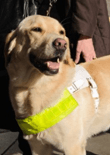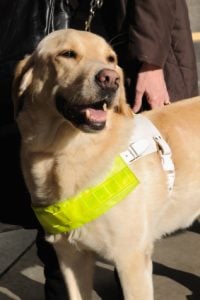
Training An Older Dog New Tricks
By Sally Gutteridge | Posts , Tricks
 A saying used daily in many circles is “you can’t teach old dog’s new tricks”. This is simply not true. A dog of any age will learn when motivation and circumstance permits. A human being can obtain a higher degree whilst simultaneously drawing a pension. A middle aged or elderly dog can learn equally well.
A saying used daily in many circles is “you can’t teach old dog’s new tricks”. This is simply not true. A dog of any age will learn when motivation and circumstance permits. A human being can obtain a higher degree whilst simultaneously drawing a pension. A middle aged or elderly dog can learn equally well.
It is undoubtedly true that a puppy is usually very trainable. Alongside the training of a puppy an owner must also tend to the socialization needs of their dog.
Many adult dogs are re-homed or rescued every day. Each of these dogs will learn to cope and interact within their new home. Many settle with few problems. Even if no tricks are taught or formal obedience learned, the new owner is training an older dog.
Military and some assistance dogs are all trained as adult donated or rescued dogs. The learning process often begins late in life for them.
If a hearing dog moves from one deaf recipient to a different one in latter canine years he will learn new things. Each hearing dog is catered to a particular recipient therefore new sounds have to be learned. Using the motivational technique of reward based training the older dog usually learns quickly and easily.
Training an older dog – The benefits
There are great benefits to training an older dog. Learning can help focus your dog’s thoughts, mentally stimulate him and help to slow any onset of confusion or dementia. Training will make your dog mentally happy and healthy regardless of his age.
Training an older dog can be a culture shock for both of you. It can be harder if you have lived with the dog for a long time. Asking your dog to do something out of the ordinary can come as a surprise. The dog will usually enjoy the change of routine and individual attention very much.
Motivation
As with all dog training regardless of the age of dog, positive and reward based methods will get the best result. Motivation is sometimes more effective for an under stimulated older dog than a young keen puppy.
Work out what best motivates your dog. If he has received no training for some time or is a new dog to you then this can take a while.
You will see when your dog is motivated by something by his behavior when the thing is produced. His eyes will light up, tail will wag and he may become physically excited and attempt to take the rewarding item from you.
Treats are a regularly used motivator. If you are considering treats for motivation it is worth starting by experimenting with the less tasty end of the scale. By doing this you will leave yourself with the option of a further and more motivational reward later on.
Toys are another good option. If your dog likes toys then find a great one that he prefers. Only get the special toy out during training times. Put the toy away at the end of each training session whilst your dog is still excited by it.
Physical praise and handling is all some dogs need for motivation.
Training an older dog that has not learned anything new for a while means that you must put some effort into motivation. A dog that is in the habit of settling down and staying in routine for many years may not be keen to change this.
Clicker Training
Clicker training is a fabulous activity for dogs of any age. It is also great fun for a handler. Watching a dog that you have known for a long time display new facial expressions, whilst they learn, is wonderful. Clicker training provides an “I am working this out” look. It builds confidence and makes dog training fascinating and fun.
Bad Habits
Training an older dog that has established bad habits can be difficult. Removing unhelpful habitual behavior and replacing it with something more useful usually calls for an approach of ignore the bad and reward the good. The dog needs to learn to offer a different behavior to the unhelpful one.
By completely ignoring any unhelpful behavior you remove attention away from the dog. If the behavior is to seek attention your dog will not receive his reward until he offers a different behavior. If the better behavior is not automatically offered then it should be quietly prompted. This is an approach that works well when training an older dog.
Human benefits
Local dog training classes are not all full of puppies. Many providers offer specific sessions that include training an older dog. Training classes are fun and social.
Stimulating your dog and working out how to help him learn is great for the human mind too. Research on positive dog training will open up a new world to you. You will certainly wonder why you didn’t teach your old dog new tricks before.


 The internet has opened up the world to us in so many ways. People can work alongside work colleagues regardless of location. Social networking has become a huge part of our lives and enables us to stay in touch easily and effectively. We can have face to face phone calls with friends and family on the other side of the globe and obtain a university degree and other top level qualifications by distance learning.
The internet has opened up the world to us in so many ways. People can work alongside work colleagues regardless of location. Social networking has become a huge part of our lives and enables us to stay in touch easily and effectively. We can have face to face phone calls with friends and family on the other side of the globe and obtain a university degree and other top level qualifications by distance learning.
 The Search and rescue dog team is an invaluable resource. Often working on a voluntary basis, handlers train their dog to find people that are lost, injured or at risk.
The Search and rescue dog team is an invaluable resource. Often working on a voluntary basis, handlers train their dog to find people that are lost, injured or at risk.
 Owning your first dog is an educational and enlightening experience. Each and every dog that you live with will teach you something new about the canine species.
Owning your first dog is an educational and enlightening experience. Each and every dog that you live with will teach you something new about the canine species.
 Deciding to offer a home to a dog is a big decision. You’ll be committing yourself to taking care of an animal for the rest of its life. The needs of any dog must be met consistently to ensure that this decision to have a dog works out perfectly. Exercise, mental stimulation with positive reinforcement and health requirements all need to be taken into account when working out how to choose a dog with success.
Deciding to offer a home to a dog is a big decision. You’ll be committing yourself to taking care of an animal for the rest of its life. The needs of any dog must be met consistently to ensure that this decision to have a dog works out perfectly. Exercise, mental stimulation with positive reinforcement and health requirements all need to be taken into account when working out how to choose a dog with success.
 The Therapy dog is a concept that has changed the lives of countless people.
The Therapy dog is a concept that has changed the lives of countless people.
 Bred initially for bull baiting and used more recently for underground dog fighting, the pitbull has suffered more than its share of both bad press and abuse at the hands of humanity.
Bred initially for bull baiting and used more recently for underground dog fighting, the pitbull has suffered more than its share of both bad press and abuse at the hands of humanity.